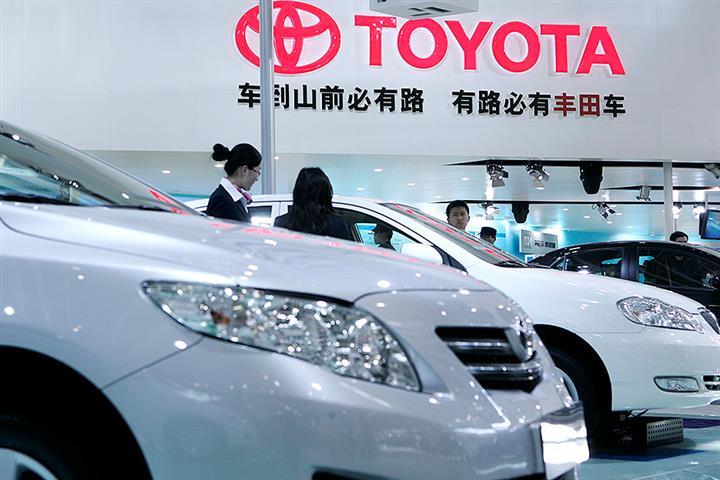- Admin
- Oct 04, 2024
- Buying Guides
- Read: Small Medium Large
Toyota's EV delay reveals price of protectionism against China
U.S. and European efforts to shield their electric vehicle markets from cheap Chinese imports are driving up prices and weighing down demand, forcing automakers like Toyota Motor to reevaluate their business strategies.
One Toyota dealership in New York was offering to lease an electric bZ4X sport utility vehicle for just under $30,000 in September -- a roughly 40% discount on its sticker price. The automaker will delay the start of EV production in North America to 2026 amid market headwinds, Nikkei reported Thursday.
Demand for EVs is softening despite worldwide efforts to promote the vehicles to curb carbon emissions. Global EV sales, which jumped 58% in 2022, are expected to grow just 9% this year, according to S&P Global.
Tesla on Wednesday said its July-September sales rose 6% on the year to 462,890 units. The figure grew for the first time in three quarters but nevertheless fell short of market expectations, pushing Tesla stock down as much as 6% that day.
The downturn stems in part from a slow rollout of EV infrastructure, as well as high prices caused by a protectionist response to China's rise in the field.
EV production capacity has outpaced demand in China, rapidly driving down prices. Nearly half of the world's top EV sellers are currently Chinese. BYD sold 419,426 new vehicles in September, up 46% from a year earlier and topping the 400,000 mark for the first time.

With at least 50 players now competing in the cutthroat Chinese market, many are increasingly turning overseas. Chinese exports of new energy vehicles -- a category that also includes plug-in hybrids -- grew 78% to around 1.2 million units in 2023, according to the China Association of Automobile Manufacturers.
In response to the influx, the U.S. in late September raised its duty on Chinese-made EVs to 100% from 25%. The Inflation Reduction Act passed in 2022 also provides a tax credit of up to $7,500 for purchases of EVs that do not contain Chinese-made batteries.
But because China essentially has a monopoly on cheaper lithium iron phosphate (LFP) batteries, these measures have meant higher prices for consumers in the U.S.
EV prices in the U.S. and Europe have risen to just below $60,000 this year from just over $50,000 in 2019, according to S&P data. Meanwhile, prices in China are at around $30,000.
Tesla has stopped taking orders for a cheaper version of its Model 3 sedan that is equipped with Chinese LFP batteries, according to Tuesday reports.
Cooling demand has led automakers to reevaluate operations. General Motors, which formerly partnered with Honda Motor, last month entered a tie-up with Hyundai Motor with an eye on South Korea's battery supply.
"The weakness in the market will persist unless automakers can make EVs priced at $30,000 or less," said Masatoshi Nishimoto at S&P.
Protectionist moves are growing beyond the U.S. The European Union in July announced additional tariffs on cheap EVs from China.
However, this applies only to imports of finished autos that were produced in China. Unlike the U.S. Inflation Reduction Act, the tariffs do not have domestic content provisions where it matters if parts and materials are sourced from China. Chinese companies are subject to only about 40% of the additional tariffs.
The added tariffs are hitting imports of EVs produced in China by U.S. and European automakers, which account for a larger slice of the pie. As a result, they are pushing up the prices of those vehicles in Europe.
One reason that China is not being specifically targeted by the European tariffs is a fear of angering Beijing. China is the largest single-nation market for new vehicles made by the major European automakers, accounting for about 30% of their global sales.
Beijing is considering raising tariffs on luxury gasoline-powered autos -- a strength of European automakers -- as retaliation for the additional tariffs. Protectionism could cause disputes to escalate and hurt the earnings of European companies.
Meanwhile, headwinds against EVs have provided a reprieve to Japanese automakers, which led the field in hybrids but have lagged in electrics.
Cutting costs will be key to boosting their competitiveness in EVs. Nissan Motor plans to "make LFPs in Japan, without depending on China," Senior Vice President Toshihiro Hirai said. The automaker is set to build a plant in Kyushu with plans to start equipping EVs with in-house batteries in fiscal 2028.
Toyota turned a battery affiliate into a wholly owned subsidiary in March, and renamed it as Toyota Battery this month. The change "is a declaration that Toyota will develop all technology and components, including batteries, in-house," Toyota Chairman Akio Toyoda said.





